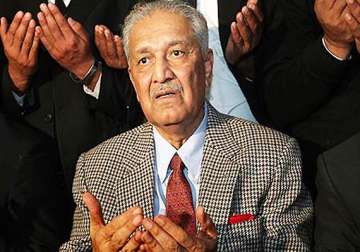US Expert Claims Khan Network Supplied Nuke Technology To India
Washington, Dec 22: A US arms control expert has made the astonishing claim that Pakistan's notorious nuclear engineer AQ Khan may have proliferated nuclear technology to India, reports Times of India. The source of the
Washington, Dec 22: A US arms control expert has made the astonishing claim that Pakistan's notorious nuclear engineer AQ Khan may have proliferated nuclear technology to India, reports Times of India.
The source of the article is as surprising as the assertion is fantastic. In a commentary in the adults magazine Playboy, Joshua Pollack, a US policy wonk who has done work on nuclear proliferation, says India may have been the secret, unnamed "fourth country" -- after Iran, Libya and North Korea -- to which AQ Khan "provided the shortcut to a nuclear weapon."
Pollack offers little credible evidence to back the contention, other than to point similarities between the centrifuges India uses in its uranium-enrichment program and Pakistan's own centrifuges engineered by Khan.
He also cites South African court documents claiming that a member of the so-called "Khan network" supplied India's centrifuge program with specialized equipment (mainly flow meters), starting in the late 1980s.
According to Pollack, although India went nuclear several years before Pakistan, it was done through the plutonium route (in 1972). But New Delhi's ability to enrich uranium remained limited, and it was not until 1986 -- by which time Pakistan had been churning out weapons-grade uranium for three years -- that India was ready to break ground on its uranium-enrichment facility.
"India's enrichment program progressed slowly...In 2006 the Washington, DC-based Institute for Science and International Security revealed that the Indian government had used news-paper ads to solicit bids for centrifuge parts. The details of these advertisements, along with documents the Indians gave potential suppliers, provide strong clues about where New Delhi's supercritical centrifuge technology came from," Pollack said.
He added, "Despite some changes, the design is recognizable to the trained eye: It almost mirrors the G-2 centrifuge, a design that Khan stole from URENCO in the 1970s and later reproduced as Pakistan's P-2 centrifuge."
Pollack also says an engineering firm belonging to Gerhard Wisser, a German living in South Africa, in collaboration with Gotthard Lerch in Switzerland, supplied specialized equipment to both Pakistan and its proliferation partners, and starting in the late 1980s, to India too. Khan, he suggests, may have known about this.
"Could Khan have been ignorant about Wisser's dealings with India? His own guilty conscience says otherwise," Pollack conjectures, writing that though Khan has never acknowledged having a fourth customer, he gave his Pakistani interrogators at least two contradictory cover stories that may explain how Pakistan's enrichment technology could have ended up in "enemy hands."
The full transcript of Khan's interrogation, said to run hundreds of pages, has never been made public, he says, but Musharraf 's 2006 memoir provides important details, he says.
At first, Khan seems to have suggested his overseas network (Lerch, Wisser et al.) was autonomous enough to supply both India and Pakistan without either side knowing. But Khan later alleged he had been exploited by an Indian connection who was hidden inside Farooq's Dubai operation.
"Ironically," he cites Musharraf writing in his biography, "the network based in Dubai had employed several Indians, some of whom have since vanished. There is a strong probability that the Indian uranium enrichment program may also have its roots in the Dubai-based network and could be a copy of the Pakistani centrifuge design."
From most accounts, the idea that Khan would have willfully proliferated knowingly to India is far-fetched considering he had a pathological hatred of the country of his origin (he migrated to Pakistan from Bhopal).
Both Musharraf and Khan have been repeatedly exposed as bare-faced liars, but Pakistani nationalists, in a bid to obfuscate the proliferation charge against Islamabad, have long alleged that India too has been a beneficiary of nuclear smuggling rings.
But the flip side to the story is that if Khan knowingly allowed nuclear technology to India, as alleged by Pollack, he would stand diminished in the eyes of his ultranationalist worshippers.
